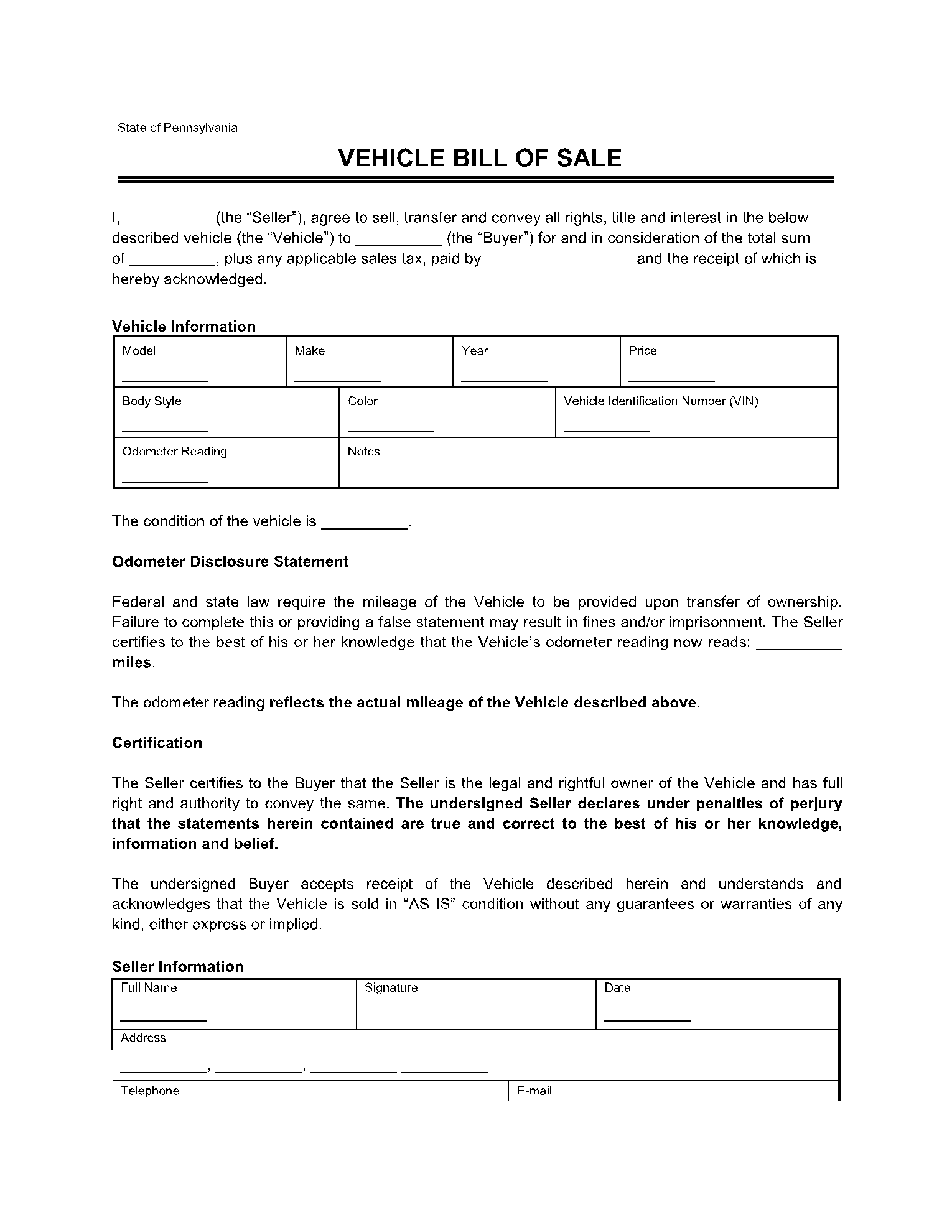What is a Vehicle Bill of Sale in Pennsylvania?
The Pennsylvania vehicle bill of sale is a simple document that serves as a legal receipt from the buyer to the Seller, confirming the selling price and the transfer of ownership. It is recommended that such a document be completed to secure the buyer's and Seller's rights in a private transaction, provide legal proof of the transaction, and provide notarized documentation of ownership transfer.
The Seller's and buyer's details, the vehicle's technical characteristics (make, model, VIN, year of manufacture), the selling price, and the sale date are all necessary for the car’s bill of sale template to have authenticity.
How to Write a Bill of Sale?
A Pennsylvania bill of sale is simple to write since it acts as a personal record. First, you'll learn what details should be included in the blank bill of sale for the car.
The following details should be written on every Pennsylvania bill of sale auto:
- The bill of sale's publication date. The formation date is listed at the top of the bill of sale. If the buyer intends to pay for an item on a different date, you must include the date in terms of sale.
- Both the buyer and the Seller's legal names and addresses.
- The item's description
- The selling terms. The price of the object and whether it is a gift or a trade are all part of the terms of sale. If you're making a trade, make sure to explain the thing you're getting in return.
- You may also add a seller's disclosure. A seller's disclosure intends to let the buyer know if the item has any flaws that the seller is aware of.
Both the buyer and the Seller should keep many completed copies of the printable vehicle bill of sale for their records.
Important Details of a Vehicle Bill of Sale Form
The Seller's and Purchaser's Information are essential details on a Vehicle Bill of Sale form.
On top of the vehicle bill form, both parties have required identifying details. Names, phone numbers, business names (if any), and addresses are among the information.
- Vehicle Description
The vehicle being sold/purchased is described below the required information. This document contains the following information:
- Year, Make, and Model of the car
- Each vehicle is given a unique number called the VIN.
- An accurate odometer reading with a note if there is a difference.
- Purchasing Costs
- The selling price of the vehicle is specified in both numerals and terms. Depending on where the payment is to be made, the payment date is often written along with it.
Either the Seller is paid on the day of the sale, or both sides consent on a separate date, written in the vehicle bill of sale form. The appropriate box is verified if the vehicle is being offered as a gift.
- Methods of Payment
This section covers the payment options that both the Seller and the buyer have agreed upon. While some sale bills do not contain this section, it is included in many states' vehicle bill forms. The Seller is either given a check or is paid in cash.
- Defects in Cars
The Seller discloses any defects that may exist in the vehicle being sold.
If there has been some prior agreement on this definition, it is mandatory to write down all known defects.
- Signatures are required to complete the transaction.
This section contains the signatures of all parties as well as the witnesses to the transaction. In addition to the signatures, witnesses must write their basic information. This is the final section of every automobile bill of sale, and it seals the deal.
Why Do You Need a Vehicle Bill of Sale in Pennsylvania?
When vehicles are sold privately, a bill of sale is used. It's a proof-of-transaction document that benefits both the Seller and the buyer of a car. It also aids the DMV in keeping track of all vehicle purchases and ensuring that everything is registered correctly. To re-register and pass the vehicle title, you'll need a printable vehicle bill of sale.
A bill of sale serves as both a receipt and a release of responsibility for a seller. This means that if the buyer says they never purchased the car from you, you'll have evidence and won't be held accountable for anything that happens to it after the sale.
Conclusion
Drafting a bill of sale for your records is a good idea. It serves as a receipt for the sale, and having one on hand can be advantageous to both the buyer and the Seller in the future. It states that the buyer has paid in full for the vehicle and that the Seller is no longer liable.
